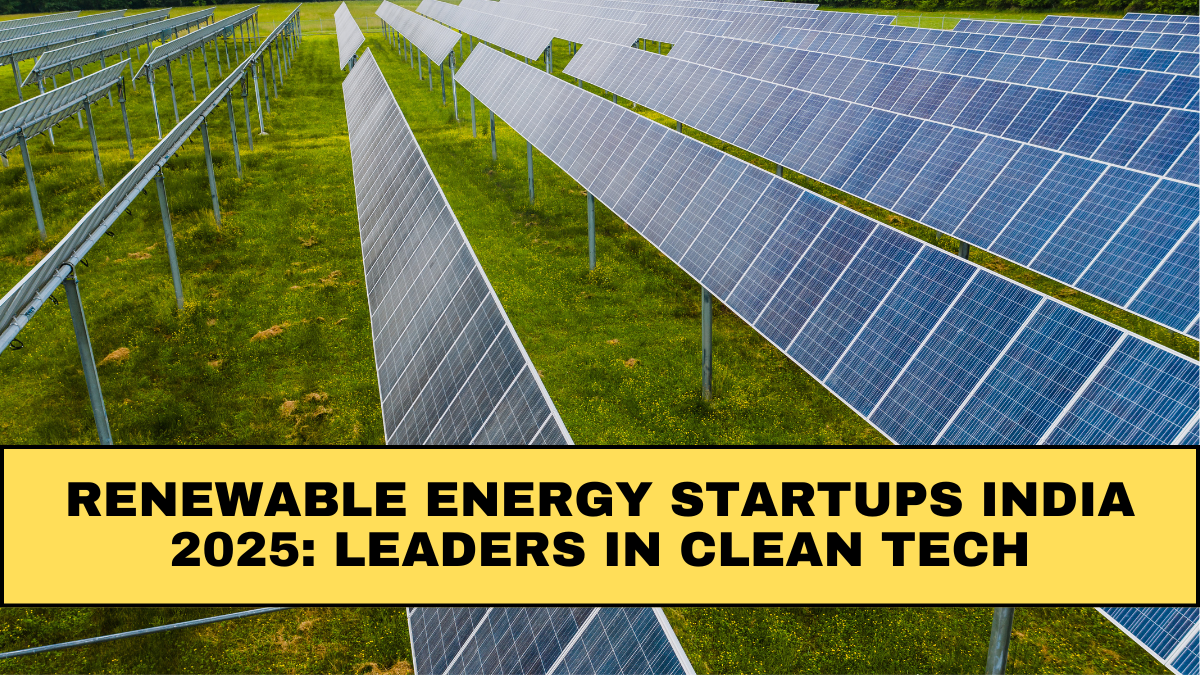India is witnessing a surge in renewable energy startups in 2025, reflecting a growing commitment to sustainable development and green business practices. These startups are spearheading innovation in solar, wind, bioenergy, and energy storage technologies, offering solutions that address environmental challenges while creating economic opportunities. As global demand for clean energy rises, India’s renewable startups are positioning the country as a hub for sustainable technology and investment.
These startups are not only driving technological advancements but also creating new jobs, promoting energy access in remote areas, and reducing dependence on fossil fuels. With government incentives, private investments, and supportive policies, the renewable energy ecosystem is flourishing, encouraging entrepreneurs to develop scalable and impactful solutions.

Growth of Renewable Startups in India
The renewable startup sector in India has grown rapidly due to rising energy demand, environmental regulations, and declining costs of renewable technologies. Solar and wind energy companies dominate the landscape, while bioenergy, hydroelectric, and hybrid solutions are also gaining traction. Many startups are focused on developing innovative energy storage systems, smart grids, and efficient power distribution networks to optimize renewable energy use.
Innovations Driving Clean Energy
Startups in India are leveraging technology to improve efficiency and sustainability. Solar panel innovations, wind turbine optimization, and AI-driven energy management systems are enabling more reliable and cost-effective power solutions. Companies are also exploring hydrogen fuel, electric mobility, and waste-to-energy technologies, expanding the scope of clean energy adoption across industries and households.
Economic and Environmental Impact
Renewable startups are contributing to both economic growth and environmental conservation. They attract investments, generate employment, and foster entrepreneurship in green technology. Environmentally, these startups reduce greenhouse gas emissions, promote sustainable energy consumption, and support India’s commitment to global climate goals. By integrating innovation and sustainability, renewable startups create a positive impact on communities and ecosystems.
Government Support and Policies
The Indian government has introduced various policies to encourage renewable energy startups. Initiatives include financial incentives, grants, tax breaks, and incubation programs to nurture clean tech entrepreneurship. State-specific renewable energy policies also promote localized projects, enabling startups to scale operations while meeting regional energy needs efficiently.
Challenges and Opportunities
While the sector is growing, challenges remain. High initial capital costs, technology adoption barriers, and infrastructure limitations can affect startup scalability. However, increasing awareness of climate change, investor interest, and advancements in technology provide immense opportunities for growth. Collaborations between startups, research institutions, and government bodies are paving the way for a robust renewable energy ecosystem.
Conclusion
Renewable Startups India 2025 are at the forefront of clean energy innovation, shaping the future of sustainable development. By combining technology, entrepreneurship, and environmental responsibility, these startups are driving growth, creating jobs, and reducing the country’s carbon footprint. With continued government support and investment, India’s renewable startups are poised to become global leaders in clean tech, fostering a greener and more sustainable future.
FAQs
What are renewable startups in India?
They are companies developing innovative solutions in solar, wind, bioenergy, energy storage, and other green technologies.
How are renewable startups contributing to the economy?
They generate employment, attract investment, and promote entrepreneurship in the clean energy sector.
Which technologies are these startups focusing on?
Solar panels, wind turbines, AI energy management, hydrogen fuel, electric mobility, and waste-to-energy solutions.
Does the government support renewable startups?
Yes, through financial incentives, grants, tax benefits, and incubation programs for clean tech entrepreneurship.
What challenges do renewable startups face?
High capital costs, infrastructure limitations, and technology adoption barriers are key challenges, though opportunities continue to grow.
